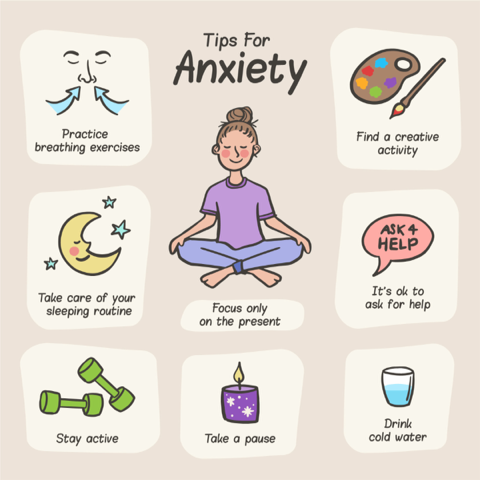Anxiety-related illnesses are on the rise. Every day, physicians are inundated with patients who report having some sort of anxiety symptom or problem. Most experience a short-term form of anxiety that goes away after a stressful or traumatic situation (for example, an exam). For others, however, anxiety persists and causes long-term effects. Anxiety can happen to anyone at any time. Unlike many other health issues, there is no single cause. Anxiety is complex, unique to each person, and for the most part, invisible to others.
Here are 11 tips for coping with an anxiety disorder:
- Keep physically active. Develop a routine so that you’re physically active most days of the week. Exercise is a powerful stress reducer. It can improve your mood and help you stay healthy. Start out slowly, and gradually increase the amount and intensity of your activities.
- Avoid alcohol and recreational drugs.
- Quit smoking, and cut back or quit drinking caffeinated beverages. Nicotine and caffeine can worsen anxiety.
- Use stress management and relaxation techniques. Visualization techniques, meditation and yoga are examples of relaxation techniques that can ease anxiety.
- Make sleep a priority. Do what you can to make sure you’re getting enough sleep to feel rested. If you aren’t sleeping well, talk with your health care provider.
- Eat healthy foods. A healthy diet that incorporates vegetables, fruits, whole grains and fish may be linked to reduced anxiety, but more research is needed.
- Learn about your disorder. Talk to your health care provider to find out what might be causing your specific condition and what treatments might be best for you. Involve your family and friends, and ask for their support.
- Stick to your treatment plan. Take medications as directed. Keep therapy appointments and complete any assignments your therapist gives. Consistency can make a big difference, especially when it comes to taking your medication.
- Identify triggers. Learn what situations or actions cause you stress or increase your anxiety. Practice the strategies you developed with your mental health provider so you’re ready to deal with anxious feelings in these situations.
- Keep a journal. Keeping track of your personal life can help you and your mental health provider identify what’s causing you stress and what seems to help you feel better.
Socialize. Don’t let worries isolate you from loved ones or activities.

